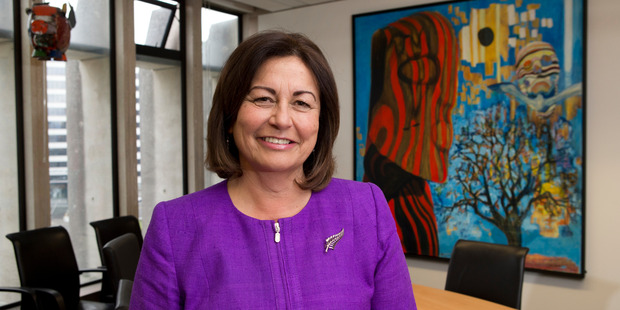Some children are starting school without the ability to speak in sentences, sparking a government investigation.
Education Minister Hekia Parata has asked officials to look into what is behind the apparent trend and what can be done to address it.
One school principal has told the Herald that New Zealand-born children at his school spoke with American accents because they’d learned to speak watching the Disney Channel.
Parata said factors could include increased screen time in front of electronic devices and fewer parents reading to their kids.
“We have been getting quite a lot of reports back – and it is becoming more consistent now – from new entrant teachers, that kids are arriving from early childhood with very poor oracy skills.
“Early childhood are reporting that kids coming to them, at 3 and 4, are also turning up with poor oracy skills.
“[It’s] not just not being able to speak. Not making eye contact with adults. Their whole interaction with people. It is a mix of stuff.”
Don McLean, principal of Hampden Street School in Nelson, said the oral language skills of about 10 to 15 of the school’s 70 new entrants each year were well below standard.
“What we’re seeing is kids who don’t speak in sentences – they speak in phrases . . . and they don’t have a very wide vocabulary.
“We had boys a couple of years ago that were from a Kiwi family but spoke with American accents. It was because they’d learned to speak watching Disney Channel.”
McLean said busy and tired parents not speaking enough with their kids was a key part of the issue, with many leaving parenting to the TV and electronic devices.

“It might sound old school but sitting around the table at night, talking about how the day went is a great way to have those conversations.
“Reading is also very important, and don’t just read to them or get them to do their reading and say ‘well done’, also discuss the book.”
The school spent a lot of time on oral language skills, but if pupils didn’t have a good foundation, it was difficult for them to keep up with their peers, McLean said.
“If they’ve got poor oral language skills, they’re also going to struggle with reading and writing. Some do catch up but others will always lag behind.”
Parata expects advice by the end of the year on how the transition between pre-school and school can be strengthened, and what can be done in early childhood to ensure children develop resiliency.

The Education Minister said she would need to wait for the findings of the work to say what was causing the apparent decline in the spoken-language abilities of new entrants.
“It’s going to be a mix of stuff like screen time, less reading between adults and kids.”
Examples of what children should be able to do upon starting school provided by the Ministry of Education include asking questions about a picture, following directions in a group setting and holding a conversation.
The issue of pupils’ speaking ability was flagged in a 2014 report by Benjamin Riley, reported on at the time by the Herald.
Riley, who is from the United States, spent seven months with the ministry and visiting schools as an Axford Fellow.
He was told by half a dozen primary schools of a marked decline in spoken-language ability. The issue affected New Zealand-born children, not just those with English as a second language.
The issue has been flagged in an “update” of the special education system focussed on high-level changes.
It proposes spending more money on preschoolers to try and help them as early as possible, with ministry officials expecting this will eventually reduce the cost of providing learning support at school.
Initial work will include looking at how help is provided for speech disorders like oral language delay, to work out how things can be improved if help is provided earlier.

Parata said another piece of work currently underway was looking at how the early childhood curriculum, Te Whariki, could be better aligned with the New Zealand Curriculum, which covers schools.
And officials are keen to make sure teachers’ professional development helped smooth the transition between pre-school and school.
Labour’s education spokesman Chris Hipkins said almost every school would report the problem of worsening oracy amongst new entrants.
“It’s difficult to draw generalisations about the backgrounds of those kids. Socio-economics plays a bit of a role. But having two full-time working parents can play a role in that. Certainly family dysfunction is one of the big drivers.”
Labour has warned that early intervention should not come at the cost of reducing support for school-age children with special needs.
Hipkins said the oral-language issue highlighted the danger in the Government’s move to enable students to enrol with online learning providers, instead of the local school.
“Person to person interaction is one of the really significant developmental things that happens to kids when they start school or early childhood education . . .they are not going to get that necessarily sitting at home in front of a computer.”
Future orators
• Help your child with simple activities and, in doing so, have lots of conversational exchanges.
• Tell children words and expressions but also make sure they are able to frequently try out new language.
• Read aloud to your children and give them time to think over what they have heard. Ask lots of closed questions (with one-word answers) and open questions (those with many different answers).
• Try to talk with, not at, your children.
• Encourage them to retell their favourite stories from books or their own experience.
The battle for education
Today: What the overhaul of the education system means for you.
Tomorrow: Who is Education Minister Hekia Parata and what is motivating a raft of changes to New Zealand’s schooling system.
~~~~~~~~~~~~~~~~~~~~~~~~~~~~~~~~~~~~~~~~~~~~~~~~~~~~~
Needing help for your home schooling journey: https://hef.org.nz/2011/
And
Here are a couple of links to get you started home schooling:
Information on getting started: https://hef.org.nz/
and
Information on getting an exemption: https://hef.org.nz/
This link is motivational: http://hef.org.
Exemption Form online: https://hef.org.nz/
Coming Events: https://hef.org.nz/